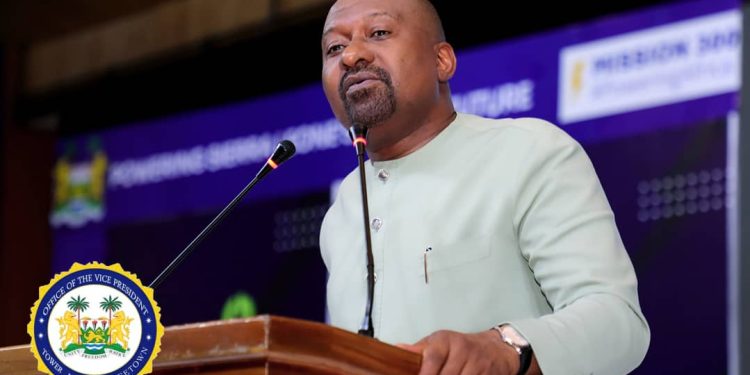By Aminata Turay
Aberdeen, Freetown, 21st October , 2025: The Hon. Vice President of the Republic of Sierra Leone, Dr. Mohamed Juldeh Jalloh, identified human development and equitable energy access remains central to building climate resilience and advancing national progress.
Speaking on the second day of the Third National Dialogue on Climate Resilience and Energy Transition (CRET 2025), held on 21 October 2025 at the Bintumani Conference Center, Dr. Jalloh said the government is commited to expanding reliable a affordable energy as a foundation for sustainable development.
“Energy transformation is not just a technical process—it is a human development imperative that improves the quality of life for every Sierra Leonean,” the Vice President stated, expressing gratitude to conference organizers and development partners for their continued collaboration.
Dr. Jalloh highlighted the tangible gains made in education and healthcare, linking them directly to increased energy access and investment.
He revealed that the Government has allocated over 20% of the national budget to human development initiatives—efforts that have led to higher school enrolment and reduced infant mortality rates.
“Our energy transformation is a pathway to healthier and better-educated communities,” he affirmed, adding that a strong human capital base is vital for enhancing the country’s resilience to climate change.
The Vice President further noted that agriculture remains the backbone of Sierra Leone’s economy and called for greater energy infrastructure to boost productivity, processing, and industrial growth.
He reiterated the government priority to strengthen domestic food production, reduce import dependency, and create employment opportunities for the youth.
“Energy is the gateway to economic transformation—driving value addition, industrialization, and job creation,” he said, inviting the private sector to play a more active role in Sierra Leone’s clean energy transition.
Concluding his remarks, Dr. Jalloh expressed optimism about the country’s energy trajectory, citing progress in national electricity access, which has risen from 16 percent in 2018 to nearly 36 percent in 2025.
He reaffirmed the government determination to extend electricity to all communities, especially the rural areas.
“This dialogue is not just about policy, it’s about people’s lives,” he emphasized. “We will act on the recommendations emerging from this conference to secure a sustainable and inclusive energy future for Sierra Leone.”
Presenting the technical outcomes of the dialogue, Fuad Yusuf Bangura, Director of Climate Change at the Office of the President, outlined several critical recommendations aimed at strengthening the country’s energy system.
Among them he said, was the urgent need to reduce system losses, currently estimated at around 50 percent, through end-to-end energy balancing and improved protection of community-level infrastructure. Stakeholders also stressed the importance of financial reforms, including operationalizing public collection accounts to enhance transparency and investor confidence.
To promote efficiency and competitiveness, the dialogue proposed the introduction of auction-based frameworks for independent power producers (IPPs), benchmarked against regional standards;
Upgrading transmission infrastructure, fast-tracking substation improvements, and expanding grid capacity to integrate renewable projects such as the Surah Solar Storage Initiative.
The dialogue went on to propose: Enhancing governance through private sector participation models like Build-Operate-Transfer (BOT), with measurable targets for loss reduction and service reliability; Harmonizing regional electricity markets and establishing a national scoreboard to track progress toward key 2030 energy goals:
78% national energy access
52% reliable supply
1.12 GW of installed capacity
25% clean cooking access
$1.4 billion in credit investments
The Third National Dialogue on Climate Resilience and Energy Transition (CRET 2025) reaffirmed Sierra Leone’s strategic vision of achieving inclusive growth through sustainable energy reform; with targeted investments, strong partnerships, and consistent policy implementation, the government aims to accelerate progress toward universal energy access and a climate-resilient future.













